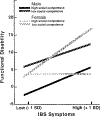Functional disability in adolescents and young adults with symptoms of irritable bowel syndrome: the role of academic, social, and athletic competence
- PMID: 10379142
- PMCID: PMC8118658
- DOI: 10.1093/jpepsy/24.3.271
Functional disability in adolescents and young adults with symptoms of irritable bowel syndrome: the role of academic, social, and athletic competence
Abstract
Objective: To examine perceived academic, social, and athletic competence as potential moderators of the relation between symptoms of irritable bowel syndrome (IBS) and functional disability in adolescents and young adults with a history of recurrent abdominal pain (RAP).
Methods: We assessed IBS symptoms, competence, and disability by telephone interview in RAP patients five years following their medical evaluation.
Results: For both male and female subjects, the relation between symptoms and disability was stronger at lower levels of perceived academic competence. Furthermore, among females, the relation between symptoms and disability was stronger at lower levels of perceived social competence; among males, the relation was stronger at lower levels of perceived athletic competence.
Conclusions: Perceived competence moderated the relation between IBS symptoms and functional disability. Interventions designed to enhance patient competence in various roles may be useful in reducing disability among adolescents and young adults with symptoms of IBS.
Figures



References
-
- Apley J (1975). The child with abdominal pains. Oxford: Basil Blackwell.
-
- Baron RM, & Kenny DA (1986). The moderator-mediator variable distinction in social psychological research: Conceptual, strategic, and statistical considerations. Journal of Personality and Social Psychology, 51, 1173–1182. - PubMed
-
- Corney RH, & Stanton R (1990). Physical symptom severity, psychology and social dysfunction in a series of outpatients with irritable bowel syndrome. Journal of Psychosomatic Research, 34, 483–491. - PubMed
-
- Drossman DA (1996). Editorial: Gastrointestinal illness and the biopsychosocial model. Journal of Clinical Gastroenterology, 22, 252–254. - PubMed
Publication types
MeSH terms
Grants and funding
LinkOut - more resources
Full Text Sources
Medical

